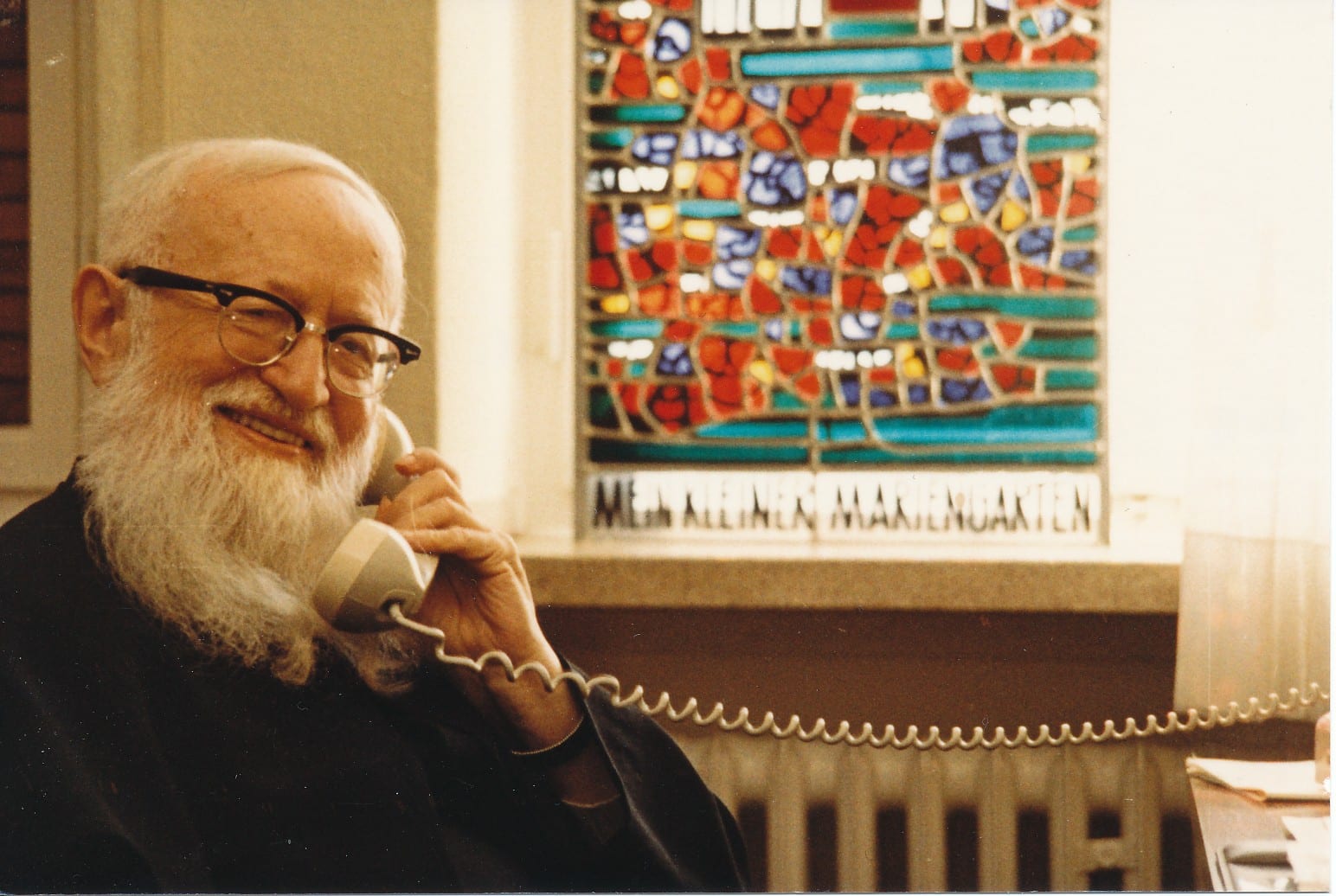Everyday Sanctity
A Christian vocation is a call to holiness
Ordinaria extraordinariae
In Schoenstatt, this call is understood as everyday (or workday) sanctity, meaning the integration of one’s faith with every aspect of ordinary life. Father Kentenich contrasted it with the Sunday sanctity of Christians who go to church on Sunday but don’t manifest their faith in everyday life.
Everyday sanctity can be described as doing one’s ordinary duties in an extraordinary way (ordinaria extraordinarie) or as fulfilling the duties of one’s state in life as perfectly as possible out of a total love for God. Father Kentenich developed its most comprehensive definition in 1932:
Everyday sanctity is the God-pleasing harmony between wholehearted attachment to God, work, and fellow human beings in every circumstance of life.
J.Kentenich
Holiness in daily life for the Schoenstatt Movement is a decisive and essential goal because it decides the future of the charism and the Work: The Covenant of Love, the basis of the International Work, which only stays valid as long as the Schoenstatt Family strives for its sanctification.
The Covenant is a contract of love that has, in its nature, rights and duties, the so-called promises and demands. There was no “apparition” of the Blessed Mother in the Schoenstatt Shrine; its origin is different from many other Marian centers. There, Mary was invited to establish herself, of her own free will, and for this the children would make every effort for self-sanctification, this is called the Covenant of Love. The fact that a Schoenstatter does not strive for sanctity means that he is breaking the Covenant.
"This sanctification I DEMAND of you,"
says the text of the Founding Document of October 18, 1914. It is not a simple request from the Blessed Mother, but a "clause", a condition that is included in this contract of love, in the mutual exchange of hearts between the two parties. "This sanctification is part of the apostolate and helps to inflame zeal for souls. It is a strong and indestructible bond that keeps us united throughout the world" (Heavenwards, 492).
Our Father and Founder, Joseph Kentenich, consistently reinforced this imperative: "Schoenstatt lives and dies according to our serious striving for holiness. Other places of pilgrimage exist without this condition. Schoenstatt, on the other hand, depends on people who really strive for holiness and who unite this striving for holiness with our Shrine."

The path to sanctity
In his pedagogy, Father Kentenich shows in a very practical way that saints are not only those who do extraordinary deeds, who are channels of unexplainable miracles, but that saints are all those who put God at the center of their lives, in everyday life, in the little everyday things, and do what God wants. Holiness is built in daily life, in the small and large acts of love offered to God by Mary's hands. For the Father and Founder, holiness is something that requires constant practice - "walking is learned by walking, loving is learned by loving".
Pope Francis makes this thought very concrete with some examples:
"A lady goes to the market to do her shopping, meets a neighbor, they start talking and then the gossip arrives, and the lady says: 'No, I won't speak ill of anyone!' This is a step towards holiness, it helps us to be holy! Then, at home, the son asks to tell you about his fantasies: "Oh, I'm so tired, I've worked so hard today...". But settle down and listen to your son who needs this! Settle down and listen patiently: it's a step towards holiness. Then the day ends, we're all tired, but there's prayer. Let's recite a prayer: this too is a step towards holiness. Then Sunday comes and we go to Mass, receive Communion, sometimes preceded by a good confession, which purifies us a little! This is another step towards holiness. Then we think of Our Lady, so good and beautiful, and recite the Rosary. This too is a step towards holiness. Then I go along the road, I see a poor person, a person in need, I stop, I ask them a question, I give them something: that's a step towards holiness! These are small things, but many small steps towards holiness. Each step towards holiness will make us better people, free from selfishness and self-absorption, open to our brothers and sisters and their needs."
Heroic lives
Creativity and Expertise, Everlasting Glow in Every Image
In covenant
Nothing without us
In the text of Schoenstatt’s Pre-Founding Document in 1912, Father Kentenich points to self-education as the means to achieve holiness, to form solid and free priestly characters. It was this same “recipe” for sanctification that he reiterated on October 18, 1914, at the founding of Schoenstatt. In this way, every effort to educate oneself, placed in Mary’s hands as a contribution to the Capital of Grace, becomes the basis and support for the Covenant of Love.
Mary forms each person who places themselves in her hands in the same way that she educated the Child Jesus. To do this, you just must be open to grace and place yourself as a little child in the Mother’s care, being attentive to fulfilling the purposes you have set yourself.
A great help in self-education comes from the Shrine: The Blessed Mother demands, but also helps, collaborates in the formation of the new man – “I will draw the hearts of the young to me and educate them to be apt instruments in my hands"
Self-education contemplates the human being in an integral way, it must be applied to the life of prayer, physical, intellectual, affective, professional, and social – a concrete point of improvement can be applied to each situation, but this requires self-knowledge.
